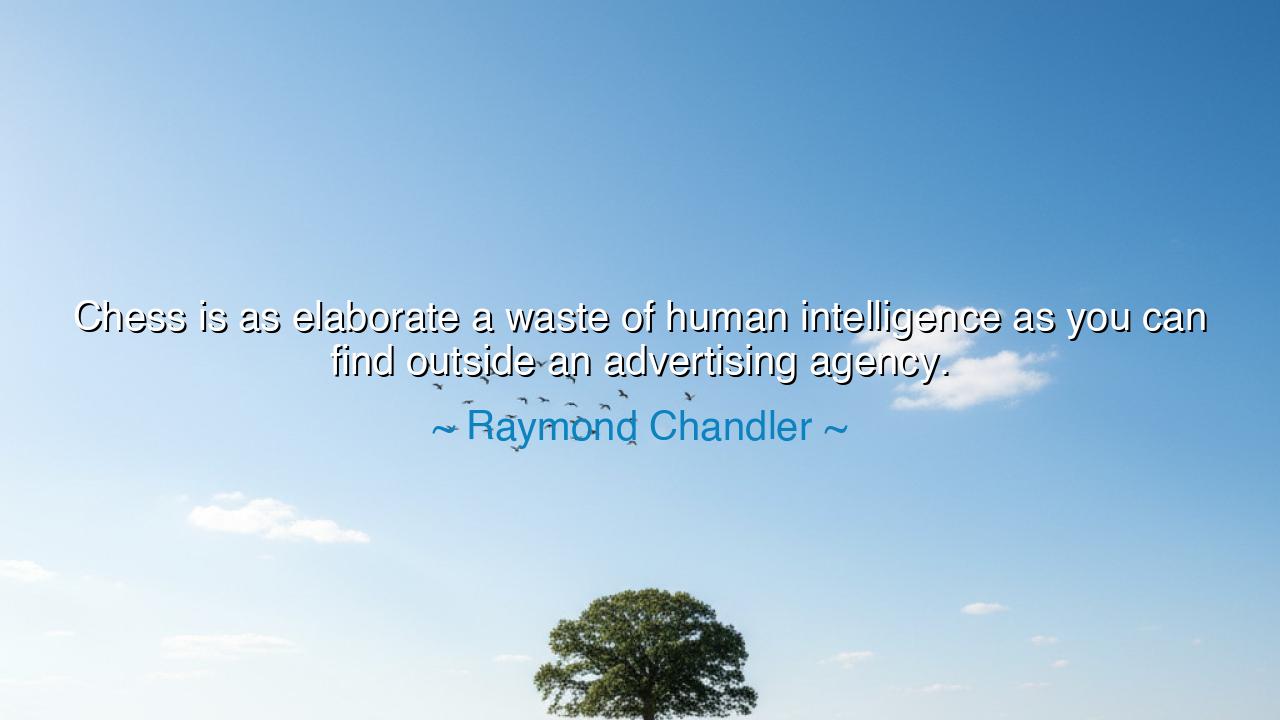
Chess is as elaborate a waste of human intelligence as you can
Chess is as elaborate a waste of human intelligence as you can find outside an advertising agency.






In this wry and cutting remark, Raymond Chandler, master of the hard-boiled word and chronicler of human folly, declares: “Chess is as elaborate a waste of human intelligence as you can find outside an advertising agency.” Beneath the cloak of sarcasm lies a profound lament — a meditation on how easily the brilliance of humankind can turn inward upon itself. Chandler, who observed both the corruption of the city and the complexities of the human heart, was no enemy of intellect. Rather, he saw how intellect, unguided by purpose, becomes a labyrinth of vanity. His quote is less about chess itself and more about the tragic irony of the human condition: that we, the most gifted of creatures, often build intricate worlds of thought that lead nowhere.
To understand the spirit of his words, one must see chess as a symbol — the eternal metaphor for strategic genius divorced from moral or creative necessity. It is a perfect universe of logic and calculation, yet it creates nothing, heals nothing, and moves no one’s heart. Each match, no matter how brilliant, ends with all pieces returned to the same positions, as if time itself were mocked. Chandler, who lived amid the mechanical glitter of early 20th-century America, saw this same sterile cleverness reflected in modern life — in the advertising agencies, where intelligence was spent not to enlighten the soul, but to manipulate desire. Thus, his tone carries both humor and mourning: humor for the spectacle, and mourning for the misdirection of genius.
Throughout history, this paradox has repeated itself. The Renaissance mathematician Girolamo Cardano, who discovered elegant formulas and intricate probabilities, spent his final years trying to divine the future through astrology. The intelligence that could have illuminated the world was squandered in self-delusion. Likewise, many modern minds, armed with infinite data, build towers of abstraction that do not serve humanity, but only the game of intellect itself. Chandler’s truth is that knowledge without compassion, thought without purpose, becomes not creation, but performance — the theater of brilliance playing to an empty hall.
Yet, we must not mistake his words for disdain toward learning or artistry. Chandler was himself a craftsman, deliberate and precise, building sentences with the care of a sculptor shaping marble. His warning is not against thought, but against thought divorced from life. In the sterile offices of the advertising age, he saw minds capable of shaping nations reduced to crafting slogans, selling illusions, and perfecting deception. In chess, he saw the same elegance — the same cold perfection — but bound within a board, where victory had no consequence beyond pride. To him, the waste lay not in intelligence itself, but in its misuse — its confinement to pursuits that neither uplift nor endure.
Consider the story of Alan Turing, the genius who broke the Enigma code and helped end the Second World War. His mind was a cathedral of logic, yet it served life, not vanity. His algorithms were not designed to win games or sell dreams but to save lives. And yet, after the war, the very society he saved turned against him, destroying his spirit. In this tragedy lies the shadow of Chandler’s insight: when a world that glorifies intellect does not also honor wisdom and humanity, it devours its own visionaries. Intelligence, left unmoored from purpose and compassion, becomes not salvation, but sorrow.
The lesson, then, is not to despise intelligence, but to direct it toward creation, connection, and compassion. Let not the mind become a servant of vanity. Use your cleverness to build bridges, not mazes; to heal, not to manipulate; to illuminate, not to impress. For the worth of thought is not measured by its complexity, but by the good it does. The poet who touches one heart with truth has accomplished more than the strategist who wins a thousand games. The thinker who kindles hope in a single soul has used his mind more wisely than the cynic who conquers debate.
And so, my child, remember this when you feel the pride of intellect rising within you: brilliance is a gift, but it is not a purpose. Knowledge, like fire, can warm or burn, depending on the hand that wields it. Let your intelligence serve something greater than itself — the beauty of understanding, the justice of compassion, the healing of the world. Then your thoughts will not circle endlessly like pawns on a board, but rise like stars toward meaning. For as Chandler reminds us, the danger is not that men are foolish — it is that they are too clever for their own good, and too blind to see the light their minds were meant to bear.






AAdministratorAdministrator
Welcome, honored guests. Please leave a comment, we will respond soon